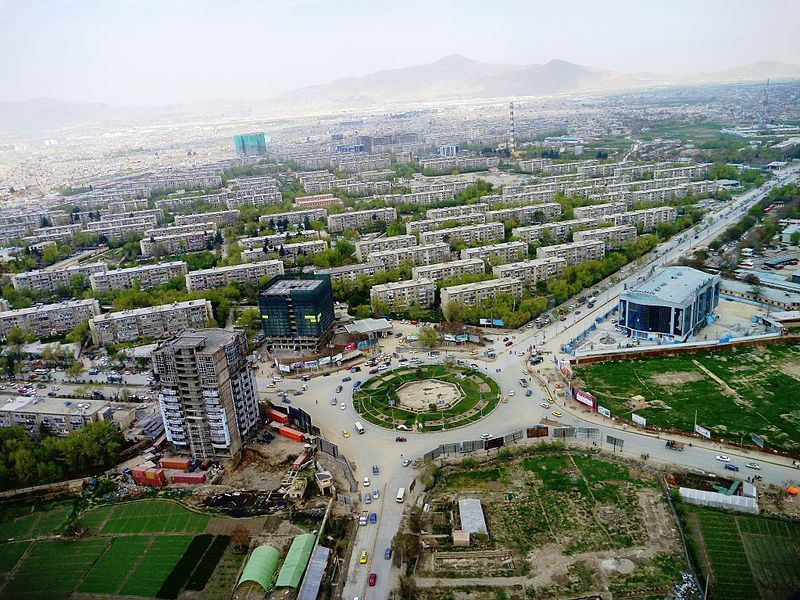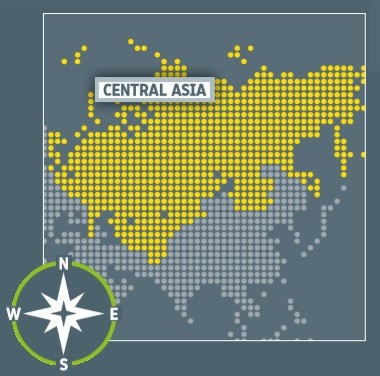
Following on from our Regional Profile on the Middle East, our journey round world Insurance and Insurtech trends today reaches its conclusion in Central Asia, geographically speaking the largest of the global markets we have explored in the course of this content series.
Today's Regional Profile on Central Asia draws on our inaugural Global Insurance Trend Map (download your complimentary copy here), in which we explore the world's major insurance markets: Europe, North America, Asia-Pacific, LatAm, Africa, the Middle East and Central Asia.
"After Russia, the largest national insurance market in Central Asia is Kazakhstan. While state ownership continues to play a major role in neighbouring Uzbekistan and Turkmenistan, the Kazakh market has positioned itself for more open competition, from domestic and foreign players alike. This trend is likely to continue across the region."
Alexander Cherry, Head of Research and Content at Insurance Nexus
As we were unable to report detailed survey statistics for Central Asia, we reached out to respondents within the region in order to compare our global trends with local perspectives and that way provide a flavour of the insurance industry in the region.
We spoke to Kevin Hartnett, Chief Operating Officer at The Insurance Corporation of Afghanistan (ICA), about the state of affairs in Afghanistan; for the time being, this is the only country in the region we are able to offer any detail on.
Country Case Study: Afghanistan
In this short profile, we begin with an inspection of the stand-out challenges facing insurers in Afghanistan, before reviewing the growth prospects for the industry there. As we have seen to a greater or lesser extent with our other geographies, there is a limit to how far we can extrapolate local trends to entire regions, so these perspectives on the Afghan market are in no way intended to be representative of Central Asia as a whole.
Indeed, Afghanistan is perhaps a unique case on account of the private insurance sector being of such recent creation there – it was only in 2007 that the Kabul-headquartered Insurance Corporation of Afghanistan (ICA) was founded, as the nation’s first private commercial insurance company.
It was as recently as 2007 that the Kabul-headquartered Insurance Corporation of Afghanistan (ICA) was founded, as Afghanistan's first private commercial insurance company.
As Kevin Hartnett explains, ‘The Central Asian Republics all have established insurance sectors. Afghanistan is very young and new, in terms of financial services. Insurance did not exist in Afghanistan, certainly in the private sector, until recently.’
Despite the relative newness of the industry in Afghanistan, Hartnett notes the enormous growth it has undergone over the past decade, key areas being Construction (a result of the large number of infrastructure projects underway), Group Personal Accident, Political Violence, General Liability, Property, Business Interruption, Aviation, Specialty Lines and Auto. The ICA currently boasts a wide roster of clients, from mining, construction and trucking companies to government, NGOs and embassies.
Hartnett characterises the Afghan industry as being driven in part by expats (drawn from the international markets, in particular from London) and in part by locally developed talent, and he commends the progress made so far in providing a local base for the industry:
‘We are very embryonic in terms of growth and sustainability, but it is an educational learning curve. We have some bright young graduates here in the local community, highly qualified – they fly through their exams, including professional financial courses over the Internet, and are insatiable in terms of their desire to learn and self-educate. So things are improving daily.’
It is clear that expats will continue to play a key role in the talent market for some time yet, as we saw in our Regional Profile on the Middle East. And regional hubs like Dubai are important as halfway houses for meet-ups with both Afghan clients and the international insurance community. There are understandably issues stemming from the relative instability of the country in recent times, but Hartnett stresses that this is more a question of the perception – not the reality – of doing business there, and he interprets the repeat visits from expat insurance professionals as a positive sign, especially when temporary trips develop into longer-term stays.
Get the full Global Insurance Trend Map free of charge here!
Regional Growth Factors
As we have seen in other parts of the developing world, the absence of a strong insurance legacy (in every sense of the term) can work in the favour of insurers looking to modernise quickly. Hartnett tends to agree with this outlook, commenting:
‘To reach the standards of our neighbouring countries and places like Dubai – that is a long way off but it will happen.’
The interconnectedness of the region – be that with the London market or with centres closer at hand, like Dubai – can certainly facilitate this sort of accelerated growth.
While the door is open to rapid innovation, this stands and falls with the domestic regulatory environment, which, as we saw in particular in our Regional Profiles on LatAm, the Middle East and Africa, has the potential both to foster and to impede insurance innovation.
Hartnett makes the case for maintaining a mutually beneficial, two-way relationship with the regulator, so that emerging legislation reflects not just the requirements of financial services in general but those of insurance in particular.
‘We try our best to keep them fully versed with ideas and innovations, especially with the potential of compulsory and mandatory insurance that we have been trying to promote ourselves, in conjunction with the Afghan Insurance Authority,’ he explains.
‘We tend to go along the lines of what our counterparts do, in Europe and to some extent in the USA and MENA region. However, we need to learn to walk before we run and it can be a slow, but methodical process.’
Insurers and the regulator can, however, only do so much between them to ramp up the industry... Growth, for both commercial and personal lines, depends on attitudes, uptake and, ultimately, penetration in the population at large.
Hartnett notes many encouraging signs in this cultural regard, and explains how customer demands and requirements are in turn shaping the ICA’s business model:
‘Within the Afghan communities, banking and insurance are growing all the time. And people are now beginning to ask the right questions, namely: do you offer risk management and consultancy services as well, alongside the normal day-to-day enquiries. We are not only an insurance company, we are advisors too. Afghan business managers are becoming more aware of coverage requirements and the need for strong risk providers in the event of loss frequency and potential claims settlement.’
One long-term factor that came out of our discussions with respondents in the Middle East was the role of Islamic attitudes in defining the insurance industry.
In the case of Afghanistan, Hartnett does not ascribe too great a determining role to Islamic Insurance, even though it is a strongly Islamic country. He remarks that Takaful Insurance, for one, is not an essential requirement in the Afghan market, and he cites the restrictions that it brings as one of the reasons for people opting for a Western style of insurance.
‘Out of the thousands of inquiries we have had over 10 years, we have probably been asked a handful of times if we provide Takaful,’ expands Hartnett. ‘It is something that we will always consider, but as a completely separate unit and largely dependent on consumer requirements and viability.’
Afghanistan: Market Outlook
Based on the regulatory and cultural attitudes we have briefly summarised here, it seems that there is no reason why we won’t witness the same Insurtech boom in Afghanistan as we are seeing elsewhere. In fact, this has already started, and we are seeing a stream of new enterprises and start-ups entering the Afghan market, a trend that will only continue, assuming regulatory requirements are met.
‘We have no doubt there will be more new start-ups, new commercial-lines insurers and probably specialised personal-lines insurers in the future. We may even have a reinsurance market in the country at some stage,’ comments Hartnett.
One more prosaic reason that may limit, though surely not for long, the growth of new-age insurance models in Afghanistan is the lack of the historical data necessary to make advanced analytics models work, at least for certain types of risk (such as natural catastrophes).
‘We cannot readily supply historical and actuarial data to the sector because it is simply unavailable, certainly in terms of financial and catastrophe data – because the market is still in a development stage,’ explains Hartnett.
‘Going forward we are some way off – not miles away but some way off – what is available systems-wise in the London market, Lloyds, or the international markets. Development in all areas of the finance sector is progressing rapidly, as are analytics and comprehensive studies, but we are reliant, to some extent, on assistance from more established markets.’
"Today, new types data are available and growing exponentially each year. Much of this data is available from external sources (from APIs and/or IoT) and can be captured in real time, and is therefore available to start-ups and incumbents alike. As a result, new market entrants have the ability to generate meaningful risk insights, in very specific areas, with new algorithms leveraging machine learning in the cloud."
Michael Quindazzi, Business Development Leader and Management Consultant at PwC
Notwithstanding, the underlying internet infrastructure in Afghanistan is strong, which does not just facilitate recruitment, training and the exchange of innovations on a global level but also means insurers in the region can look forward to gathering more and more data in future, via the Internet of Things and IT systems. Hartnett is highly optimistic about the prospects for the sector:
‘The insurance sector here is growing, and one day many of the senior roles will be managed by Afghans. And that is not too many years away. We have some exceptionally bright, intelligent, talented young people working with us.’
That concludes our Regional Profiles! If you've enjoyed the read, you can download the full Insurance Nexus Global Trend Map here (it's free!).





